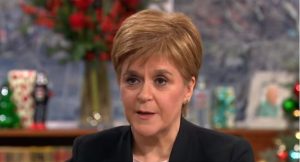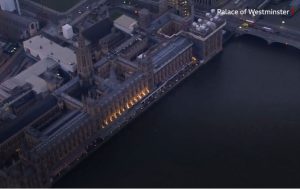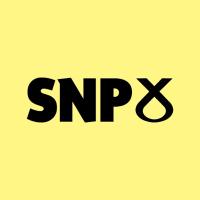LONDON, United Kingdom. ‘To Keep Scotland, Britain Must Embrace The Separatists’ By Jonathan Freedland.
Just as actors call Macbeth the Scottish play, so historians will for ever think of 2015 as the Scottish election. Whatever happens on 7 May – whoever ends up limping through the door of 10 Downing Street – the big, enduring fact of 2015 will be the shifting of the tectonic plates now under way in Scotland. It is nothing less than realignment – and it will last.
As one longstanding Scottish observer puts it, the shift in allegiance from Labour to the Scottish National party is “not cyclical”. The pendulum has swung so far, it’s snapped off.
For Labour to lose Scotland is like the Tories losing “the home counties”, says the former Scottish secretary Malcolm Rifkind. One Labour peer admitted to me this week that he’s placed a “cheeky bet” on the Tories emerging with more MPs in Scotland than Labour. That’s not a turnaround; that’s an earthquake, reshaping the landscape out of all recognition.
Participants and observers are both, blinkingly, trying to adjust their eyes to this new terrain. The appealing, if maverick, view is that the SNP’s imminent arrival in Westminster with up to 50 seats – they had just six in the outgoing house – could, paradoxically, see the separatist party embed itself in the union. If the Nats assist Ed Miliband into No 10, they will overnight be “handed a starring role at the very heart of the British state,” says the Scotsman columnist Kenny Farquharson. Scottish voters might warm to a Labour-led administration, backed by the SNP. No longer would the nationalists be able to disdain Westminster as a faraway imperial capital oblivious to their concerns. They’d be right in it.
Many of those who want this union of four nations to endure will suspect that’s too optimistic. Not because of what they predict will happen after 7 May – but because of what’s happened before it. It’s everything that’s led to this moment that has them fearing for the future of the United Kingdom.
Blame attaches first to the Tories. For one thing, they have repeatedly talked up the SNP, adding to the latter’s momentum. Tory grandees sniff at the suggestion, insisting that the Nats didn’t need to be bigged up, they’ve been getting bigger all by themselves. In which case, why was George Osborne’s first spin on the seven-way leader’s debate – and remember, this is a man who does not choose between jam and marmalade in the morning without thinking through the political implications – praise for the performance of Nicola Sturgeon? The Tories’ narrow and obvious calculation is that the SNP takes seats from Labour, so a stronger SNP is better for them.
The Osborne bouquet for Sturgeon was unusual for being so direct. The preferred method has been roundabout, aiming simply at inflaming nationalist sentiment. The bar was set low and early by David Cameron the morning after the independence referendum result. Instead of issuing a 7am message of healing and national reconciliation, he immediately declared that the real issue raised by the democratic renaissance of Scotland was … England. He implied that there could be no progress, even on honouring the “vow” he had just issued with the other Westminster leaders, until the perennial English question had been solved first.
The sheer speed of the apparent betrayal, the confirmation of the age-old nationalist caricature of unionists – and the English – as perfidious, cast the 55% who had voted no as suckers. Many decided right then that they would not be fooled again. They switched from Labour, who had partnered the Tories in the ill-conceived Better Together alliance, to the SNP. And they have never looked back.
But the insults have continued, amplified in the echo chamber of the Tory-cheering press. Sturgeon has been cast as “the most dangerous woman in Britain”, with any suggestion that the SNP might use its democratically won seats in the House of Commons depicted as a “coup”. All of this has a twin purpose: to anger Scots by making them feel like strangers in their own country – so pushing them closer to the SNP – and to stir English voters who might fear an SNP tail wagging a governing Labour dog.
The polling suggests there are not many who think that way. Indeed, many non-Scottish voters have been impressed by Sturgeon. But according to YouGov, there is an 8% slice of the electorate “not already voting Tory” who think that a Lab/SNP deal is likely and would be a bad thing, and who would prefer a Tory government. This 8%, many of them flirting with Ukip, is the target audience for those images of Sturgeon mounted on a wrecking ball or playing puppeteer to a marionette Miliband.
You can see the electoral logic clearly enough. But it is a strategy fraught with danger. As several Tory grandees, and other unionists, keep warning, the price for what may bring a narrow advantage over Labour is serious peril for the union. The rise of a party committed to the union’s break-up is the least of it.
For the Tory attack both assumes and awakens a mutual loathing between the English and the Scottish. Witness the Daily Mail columnist Sarah Vine referring to Scots and English northerners as “leeches”.
It rests on the idea that the English cannot stand the prospect of Scots having a say beyond Scotland. Hence, Tories’ unprecedented launch today, of an English-only manifesto.
In Dead Sheep, a terrific new play about the defenestration of Margaret Thatcher in 1990, we see the former PM refer to Labour not as an opponent but as “the enemy”. That is the process now under way against the SNP. It depicts them not as internal adversaries, but as an external threat – as if they have no place inside this country. Labour’s insistence that it will do no deal with the SNP, as if they are too toxic to be touched, only reinforces that feeling.
But, comes the reply, the SNP is different. The fact that they want to break up the UK puts them in a separate category. There’s some logic to that. But it misses the shift now taking place. If the predicted landslide comes, this will no longer be about the SNP. This will be about Scots and Scotland.
If the electoral map turns yellow on 7 May, then to ostracise the SNP will be to ostracise the Scottish nation that – under our first-past-the-post system – will have given that party an overwhelming mandate. To say Sturgeon’s party cannot be a legitimate partner in the governance of the UK will be to say that the Scots are not a legitimate partner in the governance of the UK. And that will be the end of the union.
It’s a paradox. The unionist parties will have to work with those who don’t believe in the union. But to do otherwise will be to pronounce the union dead.
It means unionists have to start talking about this in a different way. Maybe it was once fine to speak with venom against those who would break up Britain. But now that is heard as venom directed not at the SNP but at the people who are choosing them: Scots.
The tone has to change. Those who believe in the union need to speak respectfully of the choice their fellow citizens are about to make. It doesn’t mean they have to agree with it or like it. But the onus now is on unionists to prove the union is a hospitable, inclusive place for Scots – that they are seen not as an enemy within but as equals. If we believe in the union, we have to prove it works.
Credit: Guardian (UK)




